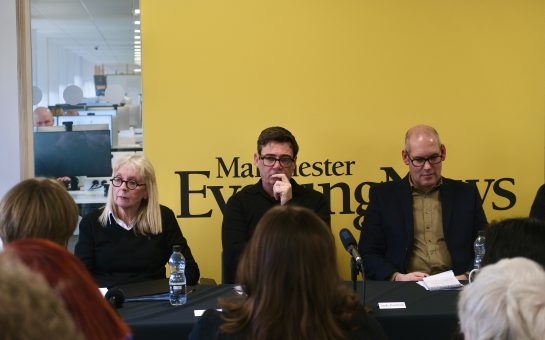‘Do something to beat what you’re afraid of… do something to make your spirits soar’.
Those are the words of Manchester poet, Tony Walsh, who is the soundtrack to this year’s Great Manchester Run.
His poem, Do Something, which features on the campaign video, encapsulates everything the run represents, and for one person in particular, those words ring loud and clear.
Jessica Smith is a 22-year-old from Bolton. Like many people her age, she graduated from university last year and is currently applying for jobs. She has a boyfriend, and enjoys going to bars and restaurants for fancy cocktails and meals.
But another fact about the Salford University graduate, which makes her like so many others out there, is her battle with anxiety.
With one in six people in the UK experiencing a neurotic disorder at some point in their life, Jessica’s story is hardly uncommon, but that doesn’t make it any less painful for the graduate.
So to combat her fears and to spin her negative into a positive, she will take part in Europe’s biggest 10k run to raise money for Anxiety UK.
I’m fundraising for @anxietyuk on @JustGiving. Please #sponsorme & RT http://t.co/TYmGCRAROA
— Jessica Smith (@jessica_md1405) February 13, 2015
“I’ve always been quite a nervous person. I’m very shy and I never used to speak in class. I’ve always had some social anxiety, but I used to get by like any shy, normal person would do,” Jessica told MM.
“My anxiety didn’t really start properly until I went to university. In the first couple of weeks, I was the victim of some sexual violence.
“There were already anxieties within me, but after those events, it got much worse.
“I was in denial for quite a while, but when I started to come to terms with the facts of what had happened to me, that’s when I started to suffer from panic attacks.”
Those moments of frenzied unease took over Jessica’s life and caused her immense mental and physical pain.
She said: “You feel like you’re out of control. You become someone else and you don’t think rationally. You have all these crazy thoughts, even suicidal thoughts.
“In my right mind, when I wasn’t having a panic attack, I wasn’t suicidal or depressed at all. It’s like a whirlwind of emotions and negative feelings about myself, and it could go on for about an hour.
“I’d cry and I wouldn’t be able to breathe because it hurt so much. It was out of control.”
Despite the fact that women rate their life satisfaction higher than men’s, their anxiety levels are significantly higher, and more than 3% of children and young adults in the UK suffer from anxiety disorders.
Jessica will also be running the 10k with her friend Hanna Sjöberg, who is raising awareness for the mental illness by posting advice videos onto YouTube.
In the Video Hanna says: “If you’re stressed out by a lot of things that you know you have to do, try to organise your time, make a plan or a schedule to make things less stressful so everything is done step by step.
“It can be hard sometimes for other people to understand what you’re going through with anxiety. If you know there are people in your life who drag you down, try to surround yourself with people who will make you feel good about yourself.”
Jessica talked about her need for absolute control in almost all situations and the toll it took on her everyday life.
“It can be stressful situations like exams, or really silly things. I put a lot of pressure on myself to achieve when I was growing up, and I still do now. If I fail, that’s when I panic,” she added.
“Once I went to a café because I wanted to treat my boyfriend to some lunch and I forgot my debit card. I took that as me failing which started a massive panic attack. I just need to have control.”
Despite being ‘over the worst of it’ and on the road to recovery, Jessica is still unable to forget those three dark years at university when her symptoms were at their worst.
She said: “Before it all started, I was quite ambitious. I wouldn’t mind meeting people, going out to places with friends or to the shops, and I was really excited to go to uni, to join societies and move into my house and meet people.
“By my second year, I wouldn’t even go to the shops on my own. I cancelled a lot of plans and couldn’t cope with the simplest of tasks.
“I acted quite a lot. It was a case of faking it until I made it. I’d go out to places but underneath, I’d be in a lot of pain.
“My chest would be really tight. It would be almost impossible to breathe. It felt like there was cotton wool stuffed all the way down my neck into my chest. When you have anxiety constantly, it never ever lets up.”
Even when Jessica wasn’t having panic attacks, she found it virtually impossible to relax and to let go of her anxieties. She resulted to a couple of techniques to manage her behaviour.
“I often found when I was getting worked up, after a while; I could tell when I’d start to panic. I’d jump in the shower and that was one of the most common ways to calm down, and I’d stay in there until I was calmer.
“Or I’d hide in bed. I just needed to be away from people to get over it.
“I don’t think my close friends and family were fully aware about how bad I was. They didn’t see the full extent.
“They just thought that I wasn’t bothered about going to places and I was a bit off or down.
“It wasn’t until I had a couple of breakdowns, where I’d ring up my mum in tears saying ‘I just need to get out of here. I can’t cope on my own’, that they began to realise.”
It was in her second and third year of university when Jessica’s anxiety was at its most aggressive, and as a victim of sexual assault, she really started to feel the effects of what had happened.
Jessica said: “It sounds silly but I couldn’t even give hugs half the time to people because I felt really claustrophobic. It affects the way that you interact with those around you.”
It was the summer in between her second and third year when she decided to get that much needed help.
However, getting that vital assistance proved extremely difficult, and still does now.
“I initially thought it would just go away, but after I had my first proper breakdown, I had to go home and that’s when I knew things had to change,” she said.
“I went to counselling in that summer provided by the NHS, but they didn’t seem equipped to deal with my situation.
“I felt that when I was telling my story, they were shocked and weren’t prepared for what I was saying. I felt like I was still on my own and not getting any help.”
It only took a couple of weeks to receive that counselling but Jessica told MM that it felt ‘patronising’ and more of a course designed ‘to help students dealing with exam stress’.
She added: “I’d told them what was happening but it just felt like I was going to counselling sessions for minor things when I needed much more.”
After attending for a few weeks, Jessica stopped going and hasn’t returned since.
Doctors recommended CBT but the waiting list to receive that type of help was several months, which was too long.
She said: “Everywhere I went, the NHS and my university, it became clear that getting proper counselling would take months.
“I even went to a charity but I’ve not heard back from them. It’s just been impossible to get the right help when I desperately needed it.
“I haven’t really had any and that is a problem which must be addressed.”
That change of attitudes towards mental health is slowly starting to creep into political parties, who now accept the widespread and ever constant problem of mental disabilities and disorders on the UK population. But Jessica believes that it needs to go even further.
She said: “The government need to recognise that mental health is a bigger issue than they think it is. It’s not just ‘oh I’ve got a bit of anxiety about going outside’ or ‘I feel a bit low’. It affects millions of people, around one in four.
“When I was at my worst, I needed therapy, but I was told I would have to wait four months on a waiting list.
“So what am I supposed to do for four months? Just sit here, struggling? I could be suicidal by then!
“They should take it as seriously as broken bones, and mental health can also be physical. When I had panic attacks, that wasn’t just in my head.
“I was physically unable to breathe. I physically could not climb the stairs at work because it hurt too much.”
Jessica discussed how no one ever mentioned any anxiety charities to her and she only learnt about them through her own research.
“If someone had pointed me in the direction of Anxiety UK, the one I’m running for, then I would have gone to them and I’m sure I would have received the help I needed,” she said.
“In the future, I’ll probably do the race again and run for other charities, but I just found that Anxiety UK has a lot of resources and information that I would have found very helpful when I needed it.
“It still helps me now, because I do still suffer from it quite badly.
“You have the phone number which you can ring to get counselling when you’re having a panic attack, and that would have been absolutely amazing if someone had told me about that.
“If people are aware of it, they don’t have to suffer on their own. If it’s common knowledge that you can do that, it could be life changing.”
Despite doctors initially putting Jessica on beta blockers, it soon became clear that that wasn’t helping and she has now switched to a different medication, which she has been taking for the past three months.
During that period, Jessica has not experienced a single panic attack.
To those who are suffering from anxiety, Jessica has said: “Start talking about your problems and start opening up to people. It is a much more common problem than people think it is.
“By talking about it, I realised almost everyone around me has either suffered it in the past, or is currently suffering with anxiety and panic attacks.
“It’s nice to open up about what you are going through. Then you can tell people ‘I’m struggling today, can you help me out?’ or ‘can you come with me to this interview so I’m calm?’. Definitely just talk about it.”
Despite managing to achieve her degree in professional broadcast techniques, Jessica only attended three lectures in her last semester.
It was the most important period of her university studies, but her boyfriend Jonathan, who she credits as being ‘incredibly supportive’, had to do her dissertation interviews for her, because she just couldn’t cope.
It is that first-hand experience of how it feels to suffer from extreme anxiety attacks which has encouraged Jessica to run the 10K, and even though it will be a challenge, it’s something that she feels she has to do.
“I used to do quite a few 5k runs for Race for Life for Cancer Research, but anxiety problems made it so hard to exercise,” she added.
“When I’ve been training for this run, I’ve had to stop quite a lot because your body goes into panic attack mode and that makes it really difficult.
“I was very inactive over the last couple of years. I tried to go running and walking, or go to the gym, but the anxiety made it really hard.
“Your heart starts racing abnormally, you start shaking, you feel weak and dizzy, and it feels like an attack is coming on.
“I’ve started walking now instead and there are still 11 weeks left until the race so I should be ok.”
First gym session today, not a bad start! 10 weeks left until 10 km run. #anxietyuk #manchesterrun pic.twitter.com/3DHPGtdoKU
— Jessica Smith (@jessica_md1405) March 2, 2015
Jessica explained that she doesn’t know what the future holds in terms of her anxiety, but she is just trying to ‘see how it goes’ and ‘take each day as it comes’.
“I’m doing this because I’ve been unable to exercise for so long, and this is perfect for that. But more importantly, it is good for my mental health and I want to raise some awareness and get people talking,” she added.
“I’ve posted the link to my Just Giving page on Facebook, so all of my family and friends can see I’ve had problems.
“It’s not a secret anymore and it shouldn’t ever have to be. It’s just so sad that people have to keep it to themselves.”
The Great Manchester Run takes place on Sunday May 10 and there are still some places left.
You can donate to Jessica’s Just Giving page here.
Image courtsey of Jessica Smith via Facebook, with thanks.



